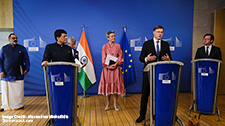Conflict Management

ISDP has always paid particular attention to issues concerning conflict management and conflict resolution in its areas of focus. From territorial disputes between states to intra-state conflicts involving a multitude of actors, the need to find and promote innovative ways to mitigate conflict and promote peace remains as relevant as ever.
In this regard, ISDP’s mission is two-fold. The first is to educate and inform through the Institute’s research and seminars about the complex causes and dynamics of conflicts as well as their resolution. Secondly, ISDP seeks to enable political, military, and other relevant actors in specific conflicts to engage in constructive dialogue and build trust.
ISDP’s approach to conflict management and mediation is based on deep understanding of both the theoretical development but more importantly its practical application. In so doing, it aims at bridging the gap between academia and practitioners.
The project aims at increasing the confidence in- and understanding of conflict management and conflict prevention in the military establishment, political elite, and research community in our regions of focus. Research projects have been established with primarily policy institutions all around Asia. Utilizing its extensive regional networks, ISDP is actively engaged in unofficial diplomatic efforts – as well as conducting training – in a number of conflict contexts, including the Korean Peninsula, Northeast Asia, the South Caucasus, and Myanmar.
Related News
Related Publications
-
Not Drawing a Parallel. Ukraine and Taiwan: An Indian Perspective
Russia’s war against Ukraine has not only had economic, diplomatic, and geopolitical repercussions, but also exaggerated the fear of accelerated conflicts in the Indo-Pacific, a region with several unresolved conflicts […]
-
Intersecting Horizons: The Nexus of Maritime Security and Global Health
The maritime industry is often regarded as one of the primary engines of the global economy as it is the backbone of global trade, accounting for around 90 percent of […]
-
EU-Thailand FTA Negotiations: IUU Fishing and Human Rights Remain Obstacles
Thailand’s fishing industry, which at its height saw as many as 200,000 migrant workers from neighboring Laos, Myanmar, and Cambodia caught in a brutal system of abuse, withered global criticism […]
-
Trade, Connectivity and Supply Chains in EU-India Relations
In the decade and a half since 2007 when the EU and India first started their FTA negotiations, the world economic order has undergone a sea change. During that period, […]
-
The Balance of Power: Taiwan’s TSMC-led Economic Might and Cross-Strait Relations
Following my previous article on the role stock exchanges play in maintaining a delicate peace between China and Taiwan, I was asked specifically about the ramifications of Taiwan’s burgeoning stock […]




